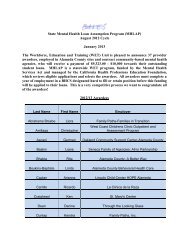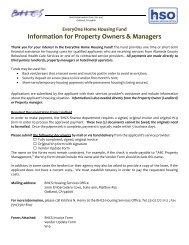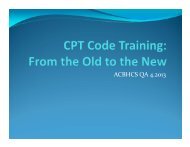Juvenile Competency Protocol - Alameda County Behavioral Health
Juvenile Competency Protocol - Alameda County Behavioral Health
Juvenile Competency Protocol - Alameda County Behavioral Health
You also want an ePaper? Increase the reach of your titles
YUMPU automatically turns print PDFs into web optimized ePapers that Google loves.
The Actual Initial Process<br />
Judge’s Inquiry<br />
If the judge is the first to doubt whether the minor is competent to enter a<br />
plea/stipulation or be tried, the judge must raise the issue of competence. The trial judge,<br />
on his or her own motion, may inquire into the minor’s mental capacity to stand trial<br />
whenever evidence presented prior to disposition raises a bona fide doubt. The doubt that<br />
triggers the trial judge’s obligation to order a hearing is not subjective, but rather<br />
determined objectively from the record. People v. Stiltner (1982) 132CA3d. 216,222.<br />
Defense Counsel’s Doubt<br />
Defense counsel may raise a doubt as to the minor’s competency. Court must<br />
assess whether counsel is merely commenting of the minor’s mental state or requesting a<br />
competency hearing under §709. If counsel is requesting a competency hearing pursuant<br />
to §709, this triggers the judge’s duty to conduct an initial inquiry whether there is good<br />
cause to commence competency proceedings. The competency proceedings are not<br />
commenced simply because there is a request.<br />
Regardless of who raises the issue of competency, the judge must make the initial<br />
inquiry if there is reason to believe competency may be at issue. The court should err on<br />
the side of conducting an initial inquiry.<br />
Inclusion of Defense Counsel<br />
If any person (such as a deputy district attorney, probation officer, family<br />
member, or probation court officer) believes the minor may be incompetent, that person<br />
should relay the belief to the defense counsel. If the issue is raised to the court, the judge<br />
should relay the information to defense counsel. Defense counsel can then apply the<br />
legal standards to the situation and make a determination whether to advise the court of<br />
potential incompetency<br />
Defense counsel is better able to collect information directly from his/her client,<br />
and observe the minor in an informal setting, such as an interview room. Defense<br />
counsel also needs to make strategic decisions regarding whether they should ask for a<br />
continuance, check on the minor’s medications or determine if the minor is in a<br />
temporary crisis.<br />
Judge Required to Exercise Discretion<br />
W&I Code §709(a) makes it clear that the judge must first find “substantial<br />
evidence” that “raises a doubt as the minor’s competency” before suspending<br />
proceedings. Proceedings are not suspended solely on an attorney’s request or upon an<br />
attorney stating the minor is incompetent.<br />
Talk to the Defense Attorney<br />
Defense counsel’s expression of an opinion of minor’s mental competence under<br />
does not violate the attorney-client privilege (Evid Code §954). Although the attorney’s<br />
opinion of competence may be principally drawn from confidential communications with<br />
9 Superior Court, <strong>Alameda</strong> <strong>County</strong>, California<br />
<strong>Juvenile</strong> Court, <strong>Juvenile</strong> <strong>Competency</strong> <strong>Protocol</strong><br />
March 1, 2013
















